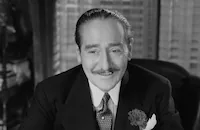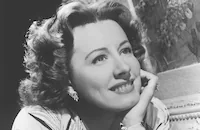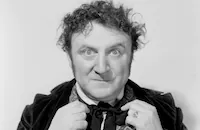The Great Lover

Brief Synopsis
Cast & Crew
Harry Beaumont
Adolphe Menjou
Irene Dunne
Ernest Torrence
Neil Hamilton
[olga] Baclanova
Film Details
Technical Specs

Synopsis
Aboard an ocean liner, famous opera baritone Jean Paurel, a philanderer and a great lover of American women, occupies himself by pursuing his amorous interests, usually married or otherwise spoken for women. Before landing in America, Paurel meets the lovely Diana Page, who has been studying opera in Italy, and, after hearing her beautiful voice, he arranges an audition for her at the opera house the next day. The temperamental Savarova, who is Paurel's former lover, is still angry over the end of their affair, which occurred many years ago, and tells the baritone that she refuses to sing with him. Likewise, Paurel tells Stapleton, the director, that he refuses to perform with her. While waiting for her appointment with Paurel, Diana happens upon Carlo, Diana's sweetheart and Paurel's understudy, who, having failed many times in the past to get her to marry him, asks her once again. Diana resents his persistence, but when she is informed that her appointment with Paurel has been cancelled, the dejected singer accepts Carlo's lunch invitation. When Diana sees Paurel descending a staircase and singing a tune with Savarova, she joins in with the musical response. Paurel then takes her to lunch, leaving Savarova and Carlo spurned. Diana's audition is interrupted by Savarova's unwelcome intrusion and her flirtations with Paurel. After Diana admits that she felt cheapened by the incident, Paurel comforts her with a kiss. Later, Paurel tells Potter, his personal valet, that he is truly in love with Diana and that he plans to marry her. Aware of Paurel's reputation with women, Carlo asks Diana if she has made love to him, and then questions her self-respect. Diana tells Carlo that Paurel spurned her, and then accompanies him to dinner. No sooner are they seated at their table, than Paurel espies her and insists that she sing for his private party upstairs. After Diana gives a wonderful performance, Paurel insists that she replace Savarova at the opening of the Metropolitan season, and then publicly announces his plans to marry her. At the opening, Diana's performance is enthusiastically received by all, and Paurel, whose voice faltered during his performance, gives her his lucky charm. In Diana's dressing room, Carlo congratulates the new star on her success, and when he kisses her, Savarova witnesses it and immediately tells Paurel. Outraged at Savarova's spitefulness in telling him such a story, Paurel yells at her, permanently ruining his voice. When Paurel's doctor confirms the end of his singing career, he tells Diana that he will devote the rest of his life solely to making her happy. After learning that Paurel plans to take Diana to Italy to train her, Carlo tells Paurel that she loves him only out of gratitude for helping her, and that he, Carlo, is her true love. Paurel realizes that Carlo is right when he sees the emotion in her eyes as she tells Carlo about her engagement. As a result, Paurel gracefully announces that he has changed his mind about taking her to Italy. Almost immediately, Paurel returns to his philandering ways and takes up an affair with Mrs. Loring, a former acquaintance, and Carlo and Diana resume their romance.

Director

Harry Beaumont
Cast

Adolphe Menjou

Irene Dunne

Ernest Torrence

Neil Hamilton
[olga] Baclanova

Cliff Edwards

Hale Hamilton

Rosco Ates

Herman Bing
Else Janssen
Crew
Merritt B. Gerstad
Cedric Gibbons
Charles-françois Gounod
Edvard Hagerup Grieg
Stanley Horsley
René Hubert
Jess Ivey
Bert Lynch
Gene Markey
Wolfgang Amadeus Mozart
Lorenzo Da Ponte
Gioacchino Antonio Rossini
Douglas Shearer
Al Shenberg
Cesare Sterbini
Paul Vogel
Richard Wagner
Helene Warne
Edgar Allan Woolf

Videos
Movie Clip



Film Details
Technical Specs

Articles
The Great Lover (1931)
In the early days of talking films, MGM had signed opera singers Lawrence Tibbett and Grace Moore in a plan to bring culture to the masses. When the masses decided the classical stars represented a form of culture they didn't want, the studio was left with projects purchased for them that needed more bankable stars. The Great Lover, for example, had been a Broadway hit in 1915 when produced by George M. Cohan and Sam Harris. Director Frank Lloyd had brought it to the silent screen in 1920, with the love story taking center stage.
Irene Dunne's casting as the young opera singer on the road to stardom was rather ironic. She had studied opera at the Chicago Musical College, but on her arrival in New York had realized she didn't really have the voice for it. Instead, she focused on musical theatre, where her smooth soprano landed her leading roles and eventually brought her to Hollywood. For The Great Lover, she had to polish up her operatic skills. The role required her to deliver the Edvard Grieg art song "Ich Liebe Dich", the Waltz from Charles Gounod's Romeo et Juliette and a duet from Mozart's Don Giovanni. Although never noted primarily as a musical performer on screen, she would find a better vocal match in Jerome Kern's songs for films like Roberta (1935), Show Boat (1936) and High, Wide, and Handsome (1937).
Joining Dunne for the Mozart duet is Adolphe Menjou, another performer not known for his musical performances. He had won the role on the strength of his silent performances as a debonair lover in films such as Charles Chaplin's A Woman of Paris (1923) and D.W. Griffith's The Sorrows of Satan (1926). The coming of sound had pushed him to supporting roles, usually as the second lead who loses the leading lady, a type he established by watching Marlene Dietrich go off after Gary Cooper in Morocco (1930). Ironically, he had played just such a role in support of Tibbett and Moore in New Moon (1930), the flop that sent MGM looking for more bankable stars for films like The Great Lover.
To many critics, unaware of the dazzling career Dunne would enjoy in later years, her performance in The Great Lover barely registered. Although Variety praised her "quiet and persuasive grace," the New York Times dismissed her as adding little to the film, while also noting that she was saddled with some badly written lines. Even with that handicap she registers better with contemporary audiences than comics Cliff Edwards, Roscoe Ates and Herman Bing, whose now-dated lowbrow antics were included at the insistence of MGM production head Irving G. Thalberg to help the film appeal to a broader audience.
The Great Lover's best notices went to Menjou and Olga Baclanova, cast as his spurned mistress and here billed solely as "Baclanova." The actress once billed as the "Russian Tigress" had studied with Stanislavsky at the Moscow Art Theatre before defecting to the U.S., where a leading performance in the Los Angeles company of Max Reinhardt's The Miracle had brought her to the attention of the Hollywood studios. After triumphs in silent films like The Man Who Laughs and The Docks of New York (both 1928), she had trouble adjusting to talking films. Her thick accent and stagy mannerisms limited her to supporting roles, particularly as exotic characters such as the temperamental diva in love with Menjou in The Great Lover. She would be best remembered for her performance as the vamp who seduces one of the little people in Tod Browning's Freaks (1932). Baclanova eventually left Hollywood to focus on stage work, starring on Broadway and in touring productions.
Director: Harry Beaumont
Screenplay: Gene Markey, Edgar Allan Woolf
Based on the play by Frederic Hatton, Leo Ditrichstein and Fanny Hatton
Cinematography: Merritt B. Gerstad
Art Direction: Cedric Gibbons
Cast: Adolphe Menjou (Jean Pourel), Irene Dunne (Diana Page), Ernest Torrence (Potter), Neil Hamilton (Carlo Jonino), Olga Baclanova (Savarova), Cliff Edwards (Finney), Hale Hamilton (Stapleton), Roscoe Ates (Rosco), Herman Bing (Losseck).
BW-71m.
by Frank Miller

The Great Lover (1931)
Quotes
Trivia
Notes
An earlier film based on the play was made by Goldwyn Pictures Corp. in 1920, with John Sainpolis and Claire Adams starring and Frank Lloyd directing (see AFI Catalog of Feature Films, 1911-20; F1.1692). According to a 1952 Los Angeles Examiner news item, Twentieth Century-Fox producer George Jessel purchased the rights to this film from M-G-M for a proposed remake which was to star Ezio Pinza, January Peerce, Roberta Peters and Robert Merrill. There is no indication, however, that this film was ever made.














